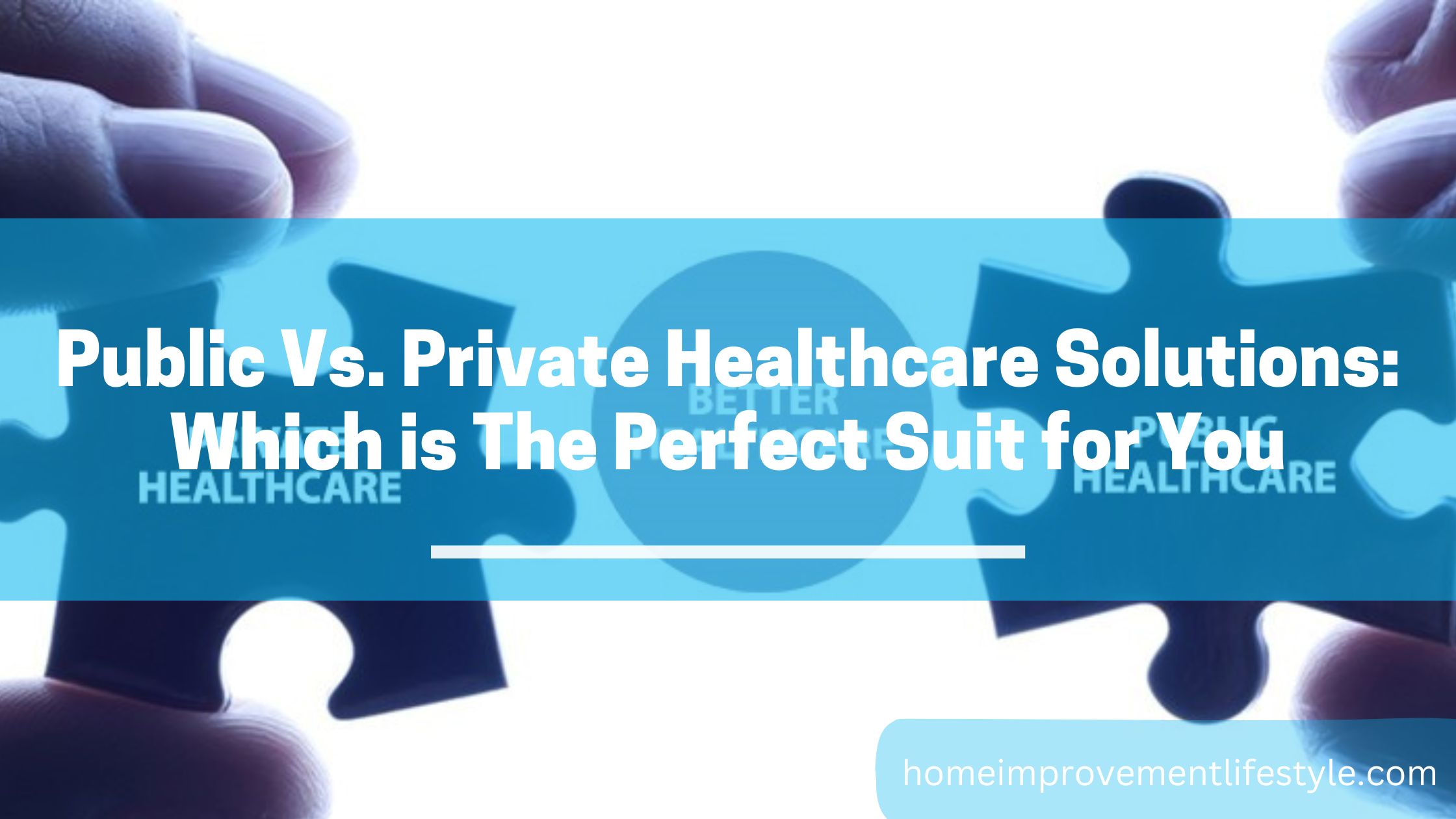In the United States, the healthcare landscape consists of a wide variety of public and private programs. This intricate system offers numerous options for securing coverage and accessing care. Although to make well-informed healthcare decisions, it is crucial to grasp the distinctions between public and private healthcare solutions.
In this article, we delve deep into the different types of plans offered by each and their advantages and disadvantages so that you can make an informed decision on which option suits the best for your needs.
Private Healthcare
Private healthcare refers to healthcare programs that are not funded by the government. This includes employer-sponsored plans, individual health insurance plans, and Medicare Advantage Plans. These plans are funded primarily through premiums paid by the policyholder or their employer.
- Employer-Sponsored Plans: Many individuals in the US receive healthcare coverage through their employers. Typically, employers offer one or more health insurance plans as a benefit to their employees. These plans can be fully funded by the employer. Partially funded by both the employer and employee or fully funded by the employee themselves. They provide coverage for a range of services including hospital stays, doctor visits and prescription medications.
- Individual Health Insurance Plans: Individuals who do not have access to employer-sponsored plans can opt for individual health insurance plans instead. These plans can be purchased directly from insurance companies or through the Health Insurance Marketplace. A service established under the Affordable Care Act (ACA). These plans also cover services like hospital stays, doctor visits, and prescription drugs.
- Medicare Advantage Plans (Part C): These private health insurance plans are approved by Medicare. Offer full Original Medicare (Parts A and B) features. In addition to that coverage, they may also include benefits, like vision and dental care.
These plans are provided by insurance companies and are primarily funded through premiums paid by the policyholder. If you’re interested you can explore the Humana Medicare Advantage plans for 2024 to understand how these Medicare options can benefit your health and well-being.
Pros and Cons of Private Healthcare
Pros:
- Faster Access: Private healthcare often ensures faster access to medical services, treatments and specialists resulting in reduced waiting times.
- Greater Choice: Private healthcare offers a broader range of options for healthcare providers, treatments and medications allowing patients to select what suits them best.
- Innovation: Private healthcare can drive innovation and technological advancements as different healthcare providers and pharmaceutical companies compete with each other to improve their services.
- Higher Quality Facilities: Private healthcare facilities mostly offer more comfortable amenities, better equipment, and more personalized care due to higher funding levels.
- Specialized Care: Private healthcare provides access to treatments and procedures that might not be readily available or prioritized in public healthcare systems.
Cons:
- Costly: Private healthcare can be costly due to premiums, deductibles and out-of-pocket expenses which may limit access for individuals with lower incomes.
- Profit-driven: In the healthcare sector, the pursuit of profit sometimes takes precedence over patient well being leading to situations where generating revenue becomes more important than providing quality care.
- Risk of Underinsurance: Private healthcare plans may not include coverage for certain medical conditions, treatments or medications. This can result in individuals being underinsured and facing costs when seeking necessary healthcare services.
- Inequality: Private healthcare can exacerbate healthcare disparities, as those with higher incomes can afford better care, while those with lower incomes might struggle to access quality healthcare.
- Administrative Complexity: Private healthcare systems typically involve multiple insurance providers, plans and policies. This complexity can make it difficult for patients to navigate the system and fully understand their coverage options.
Public Healthcare
Public healthcare refers to healthcare programs that are funded by the government. In the US, this includes programs like Medicare, Medicaid, and the Children’s Health Insurance Program (CHIP). These programs are funded primarily through taxes and provide coverage to specific groups of people, such as low-income individuals, the elderly, and children. Let’s learn a little more about each of these programs in detail:
- Medicare: This is a federal program that provides healthcare coverage for individuals who are 65 years of age or older or under 65 and have certain disabilities. There are four sections to it: Part A (covers hospitals), Part B (covers health care), Part C (covers Medicare Advantage), and Part D (covers prescription drug coverage). Medicare covers a wide range of services, including hospital stays, doctor visits, and prescription drugs.
- Medicaid: This is a joint federal-state program that provides healthcare coverage for low-income individuals and families. It covers a broad range of services, including hospital stays, doctor visits, and prescription drugs. Each state administers its own Medicaid program, so the specific services covered, and eligibility criteria may vary by state.
- Children’s Health Insurance Program (CHIP): This is a federal-state program that provides healthcare coverage for low-income children who are not eligible for Medicaid. It covers a broad range of services, including hospital stays, doctor visits, and prescription drugs.
Pros and Cons of Public Healthcare
Pros:
- Universal Coverage: Public healthcare strives to offer basic and essential health services to all citizens. Regardless of their financial status resulting in enhanced overall public health.
- Price Stability: The government’s oversight over healthcare services and medications can lead to price regulation and stabilization. Preventing higher pricing or sudden cost spikes.
- Focus on Prevention: Public healthcare systems often prioritize preventive care. Which can effectively reduce the overall burden of chronic diseases and lower long-term healthcare expenses.
- Economic Efficiency: Public healthcare can leverage its extensive scale to negotiate lower prices with healthcare providers and pharmaceutical companies resulting in cost savings.
- Income-based Funding: Public healthcare is funded through taxes ensuring a distribution of financial responsibilities based on individuals’ incomes.
Cons:
- Wait Times: Due to high demand, non-urgent procedures or specialist consultations in public healthcare systems may have longer waiting times.
- Limited Choice: Public healthcare options may restrict patients’ choices regarding providers, treatments or medications being provided to them.
- Resource Constraints: Public healthcare systems might face budget constraints. Which can lead to resource limitations, such as outdated equipment or a shortage of healthcare professionals.
- Less Incentive for Innovation: Public healthcare systems often have fewer incentives for encouraging innovative advancements in medicine and technology due to budgetary constraints and bureaucratic processes.
- Tax Burden: Financing healthcare through taxes can place a financial burden on working individuals, particularly those, with higher incomes
Comparing Public and Private Healthcare Solutions
There are several factors to consider when comparing public and private healthcare solutions, which include:
- Eligibility: Public healthcare programs like Medicare, Medicaid, and CHIP have specific eligibility criteria based on age, income, and other factors. In contrast, private healthcare plans, including employer-sponsored plans and individual health insurance plans. Are generally available to anyone who can afford to pay the premiums.
- Cost: Public healthcare programs are funded primarily through taxes. So the cost to the individual may be lower than private healthcare plans. However, private healthcare plans may offer more flexibility and choice in terms of healthcare providers and services.
- Choice of Providers: Public healthcare programs may have a limited network of healthcare providers. While private healthcare plans may offer a broader network of providers. However, private healthcare plans may also have higher out-of-pocket costs for out-of-network providers.
- Quality of Care: Both public and private healthcare plans have mechanisms for ensuring the quality of care, such as accreditation and performance measures. However, the specific mechanisms and criteria for quality assurance may vary by plan.
- Flexibility and Choice: Private healthcare plans may offer more flexibility and choice in terms of healthcare providers and services. However, public healthcare programs may have more predictable and stable costs.
Conclusion
In the US, healthcare is provided through a complex mix of public and private programs, with multiple options for obtaining coverage and receiving care. Public healthcare programs like Medicare, Medicaid, and CHIP provide coverage to specific groups of people. While private healthcare plans, including employer-sponsored plans, individual health insurance plans, and Medicare Advantage Plans, offer more flexibility and choice. The right healthcare solution for you will depend on your specific needs, preferences, and circumstances. Therefore, it’s essential to consider factors such as eligibility, cost, choice of providers, quality of care, and flexibility and choice when comparing public and private healthcare solutions.





